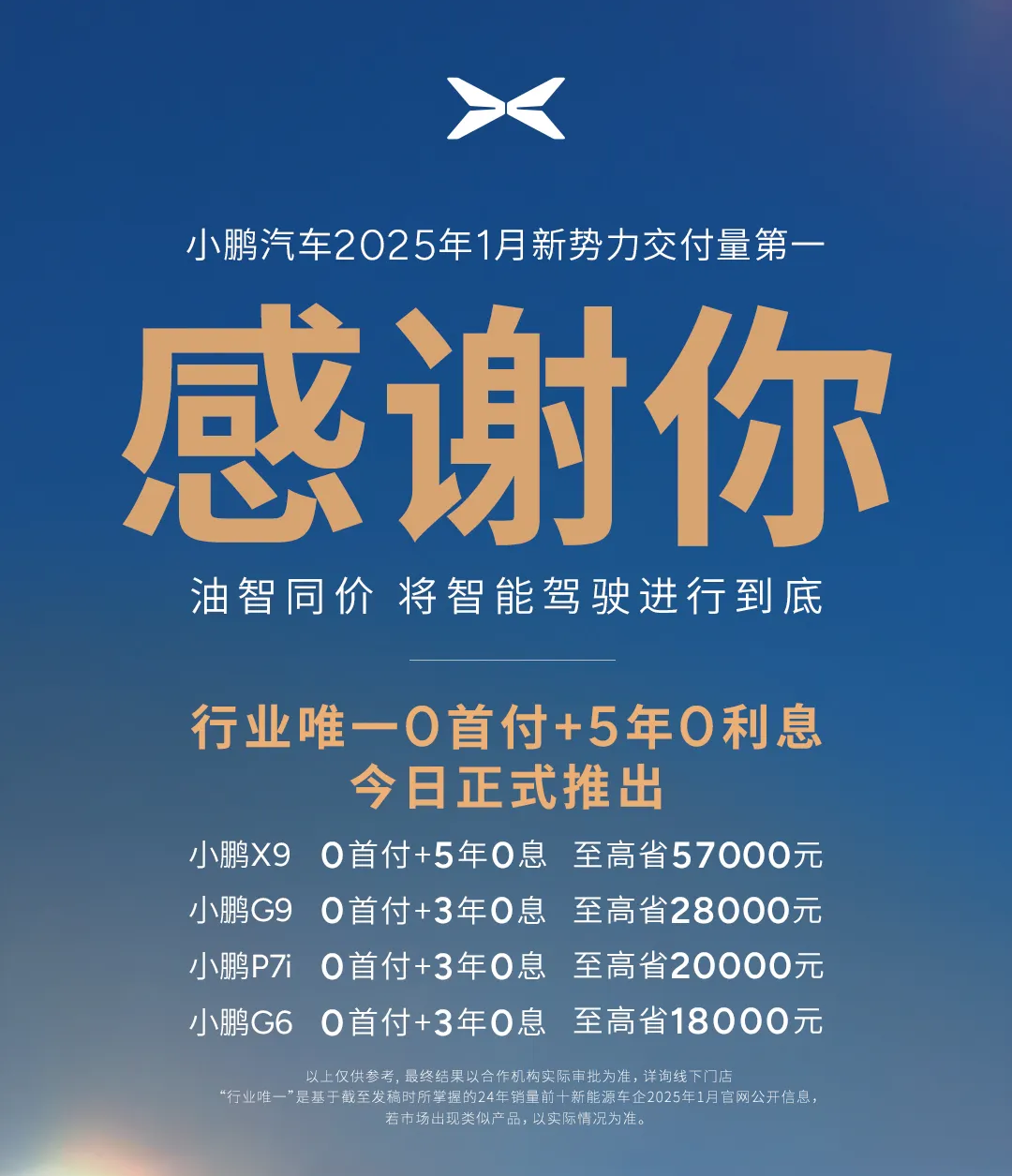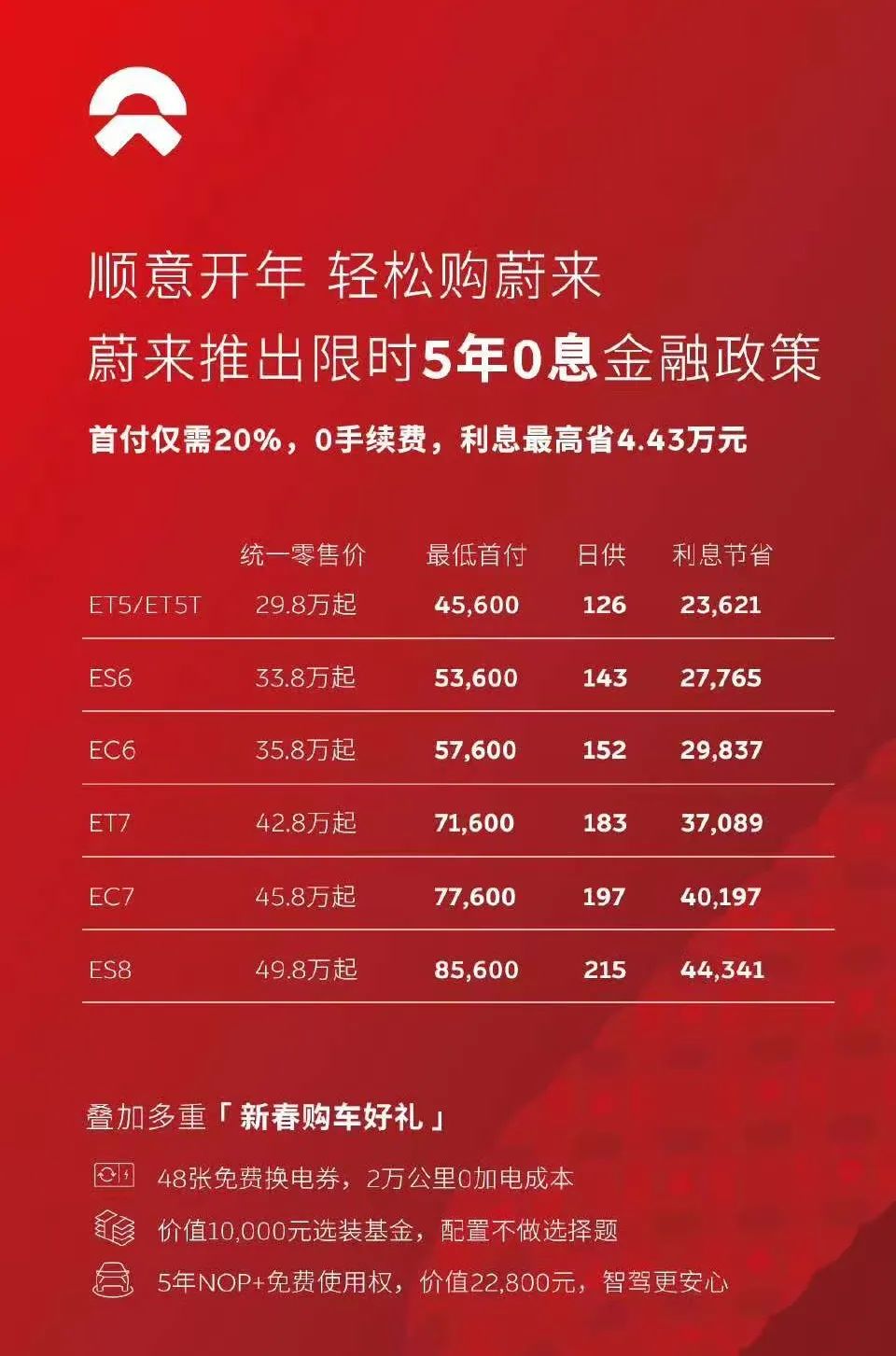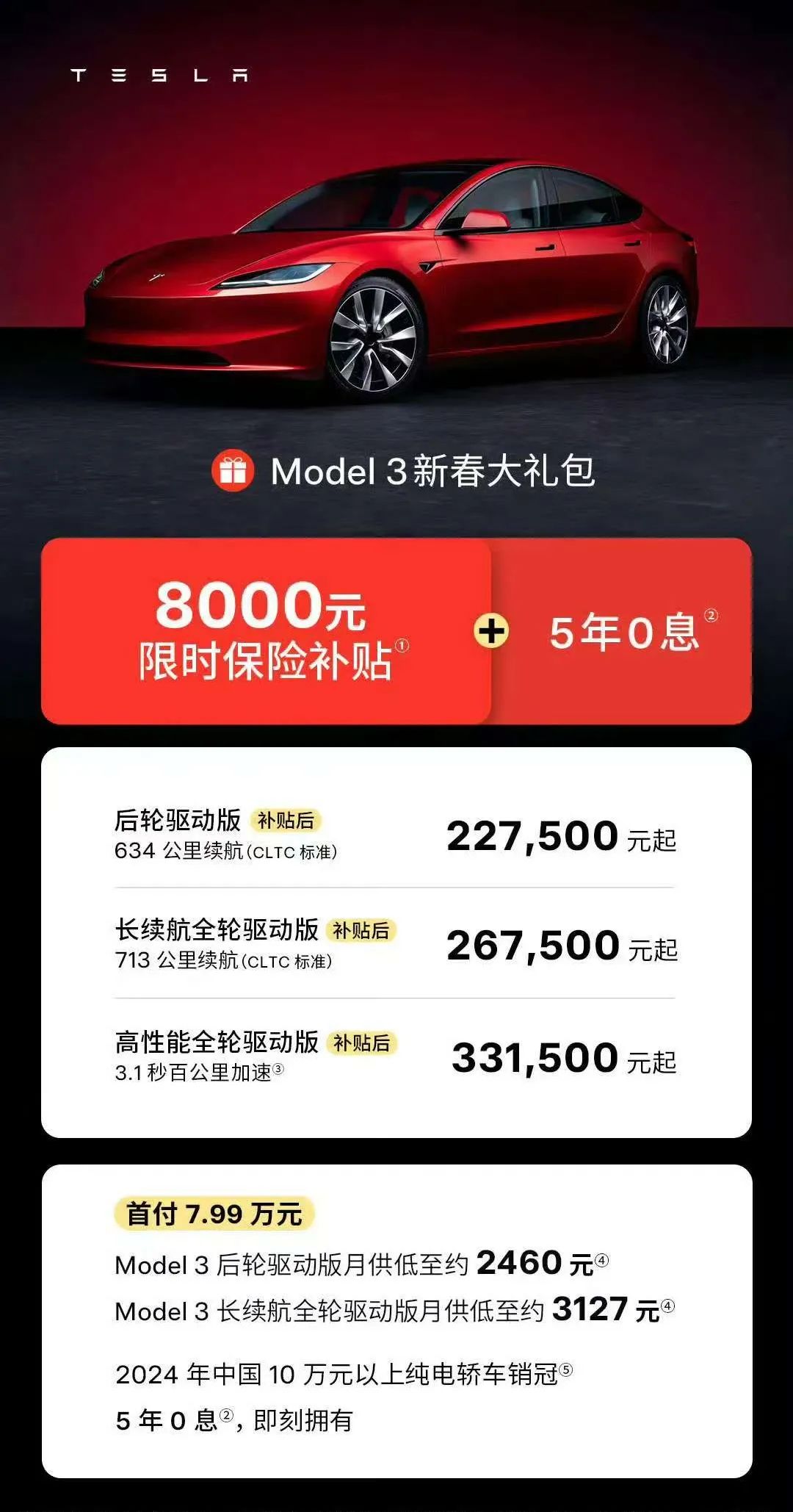Wake Up! Five-Year Interest-Free Offers: A New Front in the "Price War"
![]() 02/08 2025
02/08 2025
![]() 588
588
Introduction
The battleground has evolved beyond mere "tit-for-tat" price reductions.
"The Chinese auto market was fiercely competitive in 2024, and 2025 promises to be even more suffocating."
This is no exaggeration. In a previous year-end review, this opening line succinctly summarized and judged the market's trajectory.

Judging by the recently concluded January sales performance, all OEMs still in the game have evidently embarked on a new round of chaos. There's no holding back; they're all in.
Take the so-called "industry benchmark," Tesla, as an example.
It first unexpectedly unveiled the highly anticipated refreshed Model Y and then, on the first day after the Spring Festival holiday, officially announced a limited-time offer of free insurance and a five-year interest-free period for all models of the refreshed Model 3 in China.
This combination of measures clearly demonstrated its resolve to boost sales through price cuts.
In fact, when this American new energy automaker first introduced the five-year interest-free period half a year ago, I deemed it a clever and efficient move.
It not only maintained the product's terminal selling price in disguise but also genuinely lowered the purchase threshold for consumers, achieving a "two-pronged approach." The repeated extensions of this policy since then further attest to the significant number of orders it has garnered.
However, rationally and objectively speaking, the five-year interest-free period is essentially a "disguised official price reduction." As mentioned in today's article title, Tesla's actions continue to be part of a "price war."
Of course, Tesla is not alone in this.
A surge of new automotive forces
"Xpeng Motors delivered a total of 30,350 new vehicles in January, a year-on-year increase of 268%, marking a promising start to deliveries and reclaiming the top spot in sales among new players; on the first day of the new year, Xpeng Motors launched the industry's only five-year 0% interest and 0% down payment car purchase policy, with a maximum subsidy of 57,000 yuan; promoting the era of equal prices for oil and smart cars and pushing intelligent driving to the masses."

Whether by coincidence or design, within an hour of Tesla officially announcing the limited-time offer of free insurance and a five-year interest-free period for all models of the refreshed Model 3, its direct competitor, Xpeng, swiftly followed suit.
Xpeng even went a step further by introducing a "zero down payment" offer.
However, upon closer inspection of its related posters, there's a hint of "pushing the envelope." This is because only the Xpeng X9 is eligible. The Xpeng G9, Xpeng P7i, and Xpeng G6 offer "zero down payment + three-year interest-free." As for the currently popular Xpeng MONA M03 and Xpeng P7+, they are not participating.
Taking advantage of this opportunity, combined with clues from last month's MIIT new car declaration directory, it appears that this new automotive force is using this to clear out inventory of older models.
In contrast, NIO, whose January delivery volume was less impressive, actually unveiled its latest limited-time sales policy during the Spring Festival holiday.

The focus is undoubtedly on the five-year interest-free period for all second-generation platform models currently on sale.
Additionally, customers can receive a 10,000 yuan option fund, five years of free NOP+ usage rights, and 48 free battery swap vouchers. Taking the NIO ET5 or NIO ET5T as an example, if purchased using the BaaS battery-as-a-service model, the down payment is 45,600 yuan, the monthly payment (including the battery rental fee) is 3,768 yuan, and the daily payment amounts to just 126 yuan.
It must be acknowledged that this shows a certain level of sincerity.
Of course, it also reflects the immense pressure on this new automotive force's order volume this year. After all, Li Bin has set a goal of doubling annual sales, aiming for 450,000 vehicles. Therefore, there can be no room for error starting from the first quarter.
What's quite subtle is that, while writing this article, NIO's second brand, Ledo, also unveiled its latest sales policy. Although there's no five-year interest-free period, considering the positioning and price of the L60, the strength of the "zero down payment + three-year interest-free" offer is not insignificant.
As an observer, I must say: "Whether it's Xpeng, NIO, or Tesla, as these popular new energy brands enter the fray to harvest orders, a fierce battle is slowly unfolding."
Moving forward, I believe the term "five-year interest-free" will become increasingly prevalent in 2025. The underlying logic is that the "price war" in China's auto market simply cannot be stopped.
Is a Five-Year Interest-Free Period Really a Good Deal?
"Do you think a five-year interest-free period is really a good deal?"
"Just go for it."
The question and answer at the beginning of this paragraph stem from a conversation with a friend. With the availability of a five-year interest-free period and free insurance for the refreshed Model 3, he, who had been on the fence about buying a Tesla, is now interested.

However, he shares similar concerns with most consumers, wondering if this policy might be a financial game. My response was straightforward.
As evidence, I again use the refreshed Model 3. Its annual insurance is clearly priced at 8,000 yuan. Assuming an annual interest rate of 2.5%, adopting a five-year interest-free period can save over 22,000 yuan. Adding these two benefits together, who would turn down savings of over 30,000 yuan?
In fact, installment car purchases are more suitable for two types of consumers.
First, if your initial budget is tight but your income is stable and you have good repayment ability, then a five-year interest-free period can indeed allow you to access better products and enjoy a superior experience. Second, if you have the means to pay in full, you can still consider the five-year interest-free period. Remember, money depreciates over time, while monthly payments remain fixed, so why not?
In any case, personally, I would definitely opt for it. As for whether it's truly worthwhile, the choice ultimately lies with each individual.
Just like when I posed this question to DeepSeek, its summary was, "Under specific conditions (such as no processing fees, no additional clauses), it may be worthwhile, but hidden costs need to be vigilant. For users with sufficient funds, paying in full is still a more transparent and worry-free choice; if choosing installments, be sure to comprehensively compare the final price and strictly review the contract details to avoid falling into the interest-free trap."
In other words, there's no such thing as a free lunch, and one must act within one's means.
From this perspective, I still vividly recall BYD Chairman Wang Chuanfu's statement in 2023: "In the next 3-5 years, the overall auto market or different market segments will continue to engage in price wars."
Entering 2025, this battle is no longer a simple matter of "you drop prices, and I drop prices too." Instead, various OEMs are employing more diverse methods to harvest orders, with the five-year interest-free period being one such strategy.
Simultaneously, it's foreseeable that this brutal battle will undoubtedly become even more ruthless and unforgiving.
The price system in every segment will be completely overturned and disrupted, with one "catfish" after another frantically stirring up pieces of the red ocean. Whether it's joint venture brands or independent brands, they will all have to shed a layer of skin.
In short, before the landscape becomes clear and bright, all participants must grit their teeth and hold on. Those who benefit the most from this are always potential customers with needs.
"Wake up! It's a great time to buy a car."








